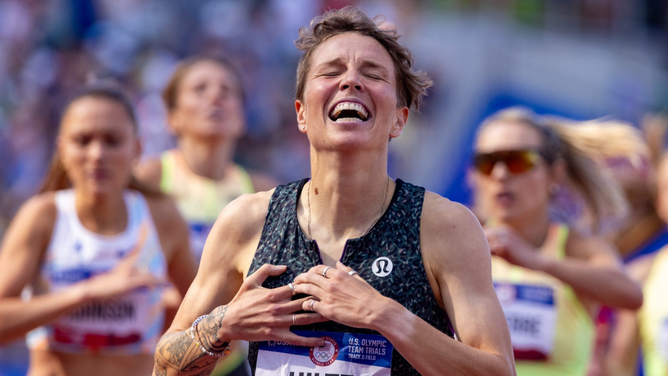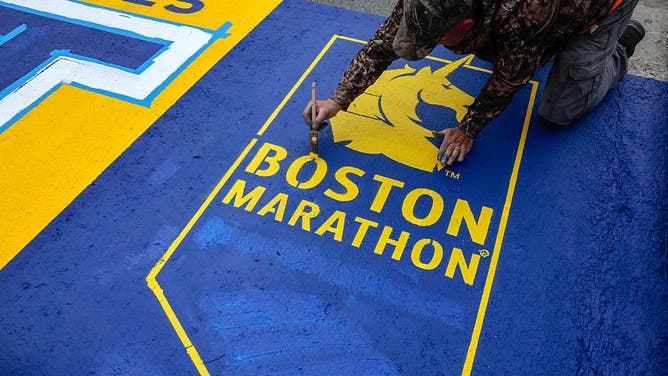'Non-Binary Transgender' Olympic Runner Nikki Hiltz Defends Men Competing As Women In Boston Marathon
Nikki Hiltz, a self-proclaimed "non-binary transgender" runner who competed in the 2024 Paris Olympics, recently applauded the Boston Marathon’s decision to allow trans-identifying males to run against women.
On Monday, one of the country’s most prestigious races will let biological men enter the women’s field —despite already having a separate non-binary category. And when a female participant expressed concern about this on social media, Hiltz took the time to insult her and throw full support behind the trans competitors.
"Are you gonna win the woman's division or take prize money? I don't think so," Hiltz said in a video posted to Instagram. "So I don't understand what you're upset about? Like, are you mad because instead of 900 you're gonna take 901st, because a trans woman maybe beats you?
"This person forgot what the point of a marathon is. It's to complete 26.2 miles and maybe make some friends along the way. Trans women are not stopping you from doing that."
But while Hiltz tried to explain "the point" of running a marathon, she completely missed the point herself.
Nikki Hiltz Expresses Hypocritical Take On Boston Marathon
A biological female, Hiltz is a self-described "non-binary transgender" person who uses they/them pronouns.
"The best way I can explain my gender is as fluid," Hiltz wrote in an Instagram post. "Sometimes I wake up feeling like a powerful queen and other days I wake up feeling as if I’m just a guy being a dude, and other times I identify outside of the gender binary entirely."
Hiltz makes it a point to reject the idea of being boxed into traditional male or female categories. Except, of course, when it comes time to race — because Hiltz competes in the women’s division.

Despite changing her gender based on her mood for the day, Nikki Hiltz feels pretty certain about being a woman on race day.
(Carl Davaz/For The Register-Guard / USA TODAY NETWORK)
The 30-year-old may reject the label "woman," but certainly doesn’t reject the competitive advantages of being a biological female racing against other biological females. Because let’s be real — Hiltz wouldn't even come close to sniffing an Olympic qualification in the men's category. Hiltz currently holds the American women's record for the mile at 4:16:35. Impressive, but it's nearly 33 seconds slower than Yared Nuguse's men's record of 3:43:97.
SIGN UP for The Daily OutKick. New Look, Same Attitude.
This is strangely reminiscent of Megan Rapinoe championing trans-identifying males in women’s sports, despite knowing full well her U.S. Women’s National Team got trounced by a group of 15-year-old boys.
And that’s the paradox: Hiltz wants to discard the concept of womanhood when it comes to identity, language and locker rooms — but embraces it the moment it offers a competitive edge. And yet, this same athlete has the audacity to lecture other women for not wanting to race against biological men.
Boston Marathon Policy Allows Participants to Self-Identify
This year, the Boston Marathon will allow trans-identifying males to compete in the women’s division —despite the fact that the race already has a separate non-binary category.
One of these competitors is Riya Suising, a biological male who qualified for the women’s field with a time of 4 hours and 1 minute. That barely clears the women’s qualifying standard of 4:05 — but it wouldn’t have even come close on the men’s side, where the cutoff is 3 hours and 35 minutes.
The women’s division was never meant to be a catch-all category for male runners who aren’t fast enough to qualify in their own field. It’s not a consolation prize for slow men. It’s a category designed to ensure that women — the actual kind — have a fair chance to compete.
And while Suising isn't going to win the Boston Marathon outright, that’s not the point. He has run in the women’s division in roughly 338 races since 2009 — and medaled in his age group more than 140 times.
How many women missed out on recognition, prize money or podium spots so that Suising could claim them instead? How many female runners showed up thinking they were competing in a fair race — only to find out they weren’t?

The Boston Marathon is held every year on Patriots' Day.
(Photo by Craig F. Walker/The Boston Globe via Getty Images)
This is not about "erasing" anyone’s identity or telling people they can’t run. It’s about fairness and holding them to the same standard as everyone else. You're a male who missed the 3:35 cutoff time for the men's division? Bummer — try again next year.
Because when biological men are allowed to compete against women, it chips away at the integrity of the sport, one race at a time. It’s not always about who wins. Sometimes, it’s about who gets bumped from the podium, who gets pushed out of the top 10 or who doesn’t qualify at all.
Every one of those moments matters to the women who trained for them. And they’re being told — by Nikki Hiltz, by race organizers and by activists in the media — that they should just smile, accept it and try making some friends along the way.